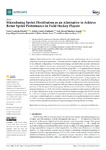Microdosing sprint distribution as an alternative to achieve better sprint performance in field hockey players

View/
Use this link to cite
http://hdl.handle.net/2183/33059Collections
- Investigación (CCDEF) [298]
Metadata
Show full item recordTitle
Microdosing sprint distribution as an alternative to achieve better sprint performance in field hockey playersAuthor(s)
Date
2023-01-06Citation
Cuadrado-Peñafiel, V.; Castaño-Zambudio, A.; Martínez-Aranda, L.M.; González-Hernández, J.M.; Martín-Acero, R.; Jiménez-Reyes, P. Microdosing Sprint Distribution as an Alternative to Achieve Better Sprint Performance in Field Hockey Players. Sensors 2023, 23, 650. https:// doi.org/10.3390/s23020650
Abstract
[Abstract]: Introduction: The implementation of optimal sprint training volume is a relevant
component of team sport performance. This study aimed to compare the efficiency and effectiveness
of two different configurations of within-season training load distribution on sprint performance
over 6 weeks. Methods: Twenty male professional FH players participated in the study. Players were
conveniently assigned to two groups: the experimental group (MG; n = 11; applying the microdosing
training methodology) and the control group (TG; n = 9; traditional training, with players being
selected by the national team). Sprint performance was evaluated through 20 m sprint time (T20) m
and horizontal force–velocity profile (HFVP) tests before (Pre) and after (Post) intervention. Both
measurements were separated by a period of 6 weeks. The specific sprint training program was
performed for each group (for vs. two weekly sessions for MG and TG, respectively) attempting to
influence the full spectrum of the F-V relationship. Results: Conditional demands analysis (matches
and training sessions) showed no significant differences between the groups during the intervention
period (p > 0.05). No significant between-group differences were found at Pre or Post for any sprintrelated
performance (p > 0.05). Nevertheless, intra-group analysis revealed significant differences
in F0, Pmax, RFmean at 10 m and every achieved time for distances ranging from 5 to 25 m for MG
(p < 0.05). Such changes in mechanical capabilities and sprint performance were characterized by
an increase in stride length and a decrease in stride frequency during the maximal velocity phase
(p < 0.05). Conclusion: Implementing strategies such as microdosed training load distribution appears
to be an effective and efficient alternative for sprint training in team sports such as hockey.
Keywords
Microdosing
Sprint performance
Team sports
Field hockey
Training load distribution
Sprint performance
Team sports
Field hockey
Training load distribution
Editor version
Rights
Atribución 3.0 España
ISSN
1424-8220






